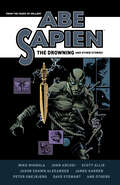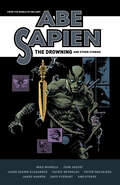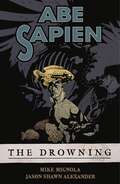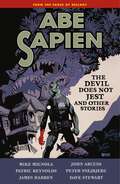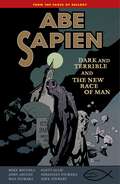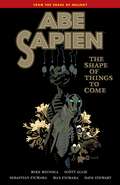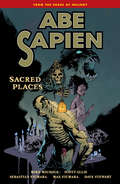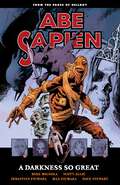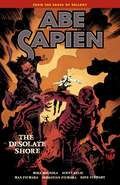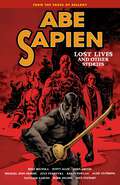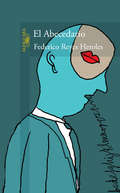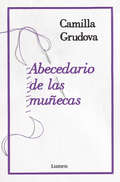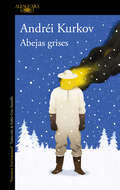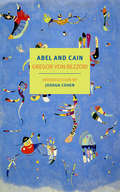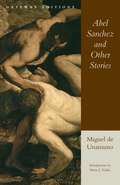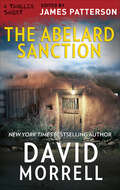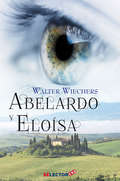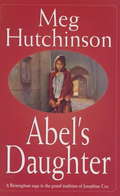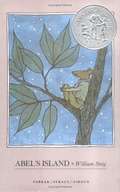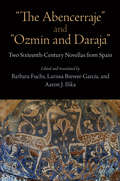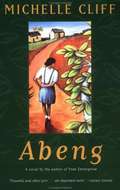- Table View
- List View
Abe Sapien: The Drowning and Other Stories
by Mike Mignola John ArcudiMike Mignola and Jason Shawn Alexander's premiere Abe solo series sets the stage for a collection of tales tracing Abe's times both as an agent of the BPRD, and delving into his long-hidden origins. A haunted lake, South American vampires, and a mad scientist seeking out man's missing link are chronicled here! This deluxe edition collects Abe Sapien: The Drowning, The Devil Does Not Jest, and Lost Lives and Other Stories In the early 1980's, new BPRD agent Abe Sapien was set to retrieve the corpse of a powerful warlock off the coast of France. Abe quickly finds himself in a battle with a century old evil in the form of demonic monks.
Abe Sapien: The Drowning and Other Stories
by Mike Mignola John ArcudiIn the early 1980&’s, new BPRD agent Abe Sapien was set to retrieve the corpse of a powerful warlock off the coast of France. Abe quickly finds himself in a battle with a century old evil in the form of demonic monks.Mike Mignola and Jason Shawn Alexander&’s premiere Abe solo series sets the stage for a collection of tales tracing Abe&’s times both as an agent of the BPRD, and delving into his long-hidden origins. A haunted lake, South American vampires, and a mad scientist seeking out man&’s missing link are chronicled here!This paperback omnibus edition collects Abe Sapien: The Drowning, The Devil Does Not Jest, and Lost Lives and Other Stories.
Abe Sapien Volume 1: The Drowning (Abe Sapien)
by Mike MignolaA century ago, paranormal investigator Edward Gray fought and destroyed a powerful warlock off the coast of the island of Saint-Sébastien. In the early 1980s, the B.P.R.D.'s newest agent was sent to retrieve the warlock's remains. But Abe Sapien is ill prepared for the dark forces that block his way. Written by Hellboy creator Mike Mignola, and featuring the haunting art of Jason Shawn Alexander (Damn Nation, The Secret, The Escapists), Abe Sapien: The Drowning is the story of Hellboy and B.P.R.D. mainstay Abe Sapien's first solo adventure.* "... this haunting trade by Mike Mignola and Jason Shawn Alexander will leave you gasping for air." -Wizard*
Abe Sapien Volume 2: The Devil Does Not Jest (Abe Sapien)
by Mike MignolaAbe gets his hands dirty in these early adventures! Paranormal crime scenes wreak havoc on Abe Sapien as he investigates a recluse demonologist's evil house, a haunted lake, and a sunken Soviet submarine filled with zombies! • "If you are a fan of horror and suspense in the vein of H. P. Lovecraft like I am, then you'll thoroughly enjoy this miniseries."—Comic Book Movie
Abe Sapien Volume 3: Dark and Terrible and the New Race of Man (Abe Sapien)
by Mike MignolaOn the run from the Bureau for Paranormal Research and Defense, a mutated Abe Sapien faces horrifying monsters, desperate madmen, and cities in ruin, on his quest to reveal his own role in the end of the world. Collects Abe Sapien #1–#5. * The beginning of the new ongoing series! "Fiumara's art is gorgeous."—Comic Book Resources
Abe Sapien Volume 4: The Shape of Things to Come (Abe Sapien)
by Mike MignolaDirect from the pages of Hellboy and B.P.R.D.!A mutated Abe Sapien fights carnivorous monsters crawling out of the desert sand, a fortified militia that's walled Phoenix off from the rest of the world, and a viscous zombie swarm, while a mad necromancer rises over the monster-infested ruins of Seattle.
Abe Sapien Volume 5
by Mike MignolaHaunted by deaths he's seen and ones he's caused, Abe returns to the place where he was shot, where his latest transformation began. His path is blocked by strange priests, apocalyptic prophets, and one doomed soul after another, who all seem to think Abe is either the answer or the cause.
Abe Sapien Volume 6: A Darkness So Great
by Mike MignolaAbe Sapien stands accused of bringing about the end of the human race. He hits the devastated Gulf Coast, where the infestation of monsters began and a volcano leveled Houston, driving out most of the population. Taking refuge with a Mexican death cult in a strangely preserved south Texas town, Abe stands to lose what little he has left, where demons dwell and the dead walk. Abe Sapien Volume 6 collects Abe Sapien #18-22.
Abe Sapien Volume 8: The Desolate Shore
by Mike MignolaOn the run at the end of the world, Abe Sapien's Dark and Terrible story reaches its finale, and the answers he uncovers about his own existence reveal some of the biggest secrets of the Hellboy saga.AWOL from the Bureau for Paranormal Research and Defense for more than a year, Abe travels to lost two lost kingdoms before returning to America. There he'll confront the most nightmarish version of the fate he's run from all along, as well as the necromancer who sees Abe as a means to control the end of mankind.Collects Abe Sapien #32-37Praise for the comics that comprise Abe Sapien Volume 8: The Desolate Shore:"The art by Max Fiumara is still tremendous too. Along with Dave Stewart's darkly textured color work, this series is so monster-ifficly good looking, I wish each issue would never end." -Coverless Reviews"If you already like Abe Sapien, you will continue to like it--buy this! If you like Hellboy but aren't reading Abe Sapien, you will definitely also like it!" -Geeks With Wives
Abe Sapien Volume 9
by Mike MignolaAbe Sapien confronts South American vampires, a lake serpent, and a disembodied Lovecraftian tentacle, while uncovering the secrets of a 19th century necromancer who still walks the earth, and a frozen merman that may prove to be the missing link between himself and mankind. These five stories trace the history and pre-history of Abe Sapien's adventures, from his earliest days in the Bureau with Hellboy (as drawn by Kevin Nowlan) through the frog war, featuring an appearance by deceased homunculus Roger, to his current evolved form, when he's looking back on his life as a man in 1850s England. Featuring Powers co-creator Michael Avon Oeming and Santiago Caruso, whose artwork Puxtapoz Magazine called "both magnificent and macabre."
El Abecedario
by Federico Reyes HerolesAfter the death of his wife, professor Samuel Urquiaga has a house all to himself, the piano his beloved used to play and now echoes silently, the classes he enjoys more than anything in his now sad life, a couple of friends, no children, and a ton of loneliness. Happiness, like love, seems to have vanished forever--desire, however, is still there. Samuel looks to satisfy his need in hired embraces but will this be enough to live out the remainder of a life that now feels eternal? In search for answers, Samuel begins an intimate glossary of essential terms: Depression, Embrace, Frenzy, Heat, Madness, Oblivion, Wisdom. . .
El Abecedario
by Federico Reyes HerolesTras la muerte de su esposa, Samuel Urquiaga está solo. En su búsqueda de respuestas, decide escribir un Abecedario sobre el amor. Del autor de Ante los ojos de Desiré, Noche tibia y El abismo, Federico Reyes Heroles. Una misma vida transita por amores de diferente calidad e intensidad. Los amores son presas huidizas, que demandan de quien desea amar y ser amado, un cazador en alerta permanente. Tras la muerte de su esposa Marisol, el profesor Samuel Urquiaga tiene una casa sólo para él, un piano que su amada tocaba y ahora parece interpelarlo en silencio, unas clases que disfruta impartir más que cualquier otra cosa en su ahora triste vida, un par de amigos y mucha soledad. El matrimonio no tuvo hijos, así que ni siquiera ese consuelo le queda. La alegría parece haberse ido para siempre, al igual que el amor, incluso que la mera posibilidad de volver a encontrarlo. El deseo carnal, sin embargo, sigue ahí y Samuel busca satisfacerlo en abrazos mercenarios... pero eso es todo. ¿Le bastará a Samuel para vivir medianamente satisfecho un trecho de vida que se antoja cada vez más largo? A la búsqueda de respuestas, Samuel empezará la redacción de un Abecedario, un glosario íntimo de ideas, nociones y especulaciones ordenado alfabéticamente y que terminará conteniendo cosas tan imprescindibles como Abrazo, Calor, Depresión, Frenesí, Humildad, Locura, Olvido, Sabiduría... Los que deseen conservarse atrapados por la sorpresa constante de los amores, deberían elaborar un abecedario. Samuel Urquiaga, un filósofo amoroso, busca el reencuentro con la vida y nos regala su abecedario.
Abecedario de las muñecas
by CAMILLA GRUDOVACUENTOS QUE NO SE PUEDEN CONTAR: HA NACIDO UNA GRAN ESCRITORA «Hay ecos de David Lynch, Margaret Atwood y Angela Carter en esta colección de alegorías feministas y sátiras surrealistas. Que no pueda decir de qué van todas estas historias es una buena muestra de su valor. Me han estado rondando desde hace días. Tienen un sabor único, especial, y la inevitabilidad de los sueños perturbadores.»Nick Lezard, The Guardian Muñecas, máquinas de coser, ropa interior, lobos, sirenas, espejos y cuerpos disfuncionales son algunas de las muchas imágenes que pueblan estas historias en apariencia infantiles pero profundamente oscuras, como la del primer relato, «Descosida», en el que una mujer se descose, pues en su interior reside la verdad, y desata una revolución. Reseñas:«El estilo de Grudova es un cóctel exótico: tres partes de realismo mágico, dos de distopía y un toque de feminismo extremo. También una inteligencia lúdica, que impulsa estas extrañas historias, así como un talento real e innegable.»Daily Mail «Esta colección de relatos tiene algo de Dickens, de Kafka y de Heinrich Hoffmann, pero el efecto que producen es deliciosamente inclasificable. El mundo de Abecedario de las muñecas -curioso, inexplicable y hermoso- difiere de todos los que conozco.»The Wall Street Journal «Como una hija nacida del amor literario entre Liudmila Petrushévskaia y Margaret Atwood, Grudova alterna historias sobrenaturales y humanas, y resulta difícil decidir con cuáles perturba más. Construye un universo intrincado y bello, un retrato impresionante de lo insólito.»Literary Hub «Hay ecos de David Lynch, Margaret Atwood y Angela Carter en esta colección de alegorías feministas y sátiras surrealistas. Que no pueda decir de qué van todas estas historias es una buena muestra de su valor. Me han estado rondando desde hace días. Tienen un sabor único, especial, y la inevitabilidad de los sueños perturbadores.»Nick Lezard, The Guardian «Abecedario de muñecas crea un mundo, un paisaje que nunca antes había visto, pero que ahora parece que ha estado esperando para capturarnos y cautivarnos.»Sheila Heti «Como una astuta artista de collages con ojo para lo cómicamente macabro, Grudova rescata sus imágenes de estéticas victorianas y eduardianas, pero su ironía y percepción de las desigualdades en las relaciones entre hombres y mujeres son sorprendentemente actuales.»Publishers Weekly «El efecto de las leyes sociales absurdas, antinaturales, crueles e injustas que aparecen en estos relatos sirve para hacernos ver lo absurdas, antinaturales, crueles e injustas que pueden llegar aser las leyes de nuestra sociedad.»Kirkus Reviews
Las abejas
by Historias Del AticoSer reportero de un periódico local es una ocupación extraña. En esencia, es exactamente lo mismo que ser reportero de una importante organización de noticias. Me refiero a que los procesos reales son los mismos. Encuentras una historia, entrevistas a los involucrados o más cercanos a la historia y luego encuentras una manera de presentar los hechos al público de una manera objetiva y, si es posible, entretenida. Los aspectos prácticos de la tarea son los mismos. La diferencia son las historias. La mayoría de las historias que cubre el periódico local son aburridas. Si no lo fueran, entonces no estarían en el periódico local en primer lugar, estarían en los nacionales. En un periódico importante, las historias son como planetas, tienen satélites. Otras historias más pequeñas que circulan alrededor del hilo principal, en el comercio llamamos a estas 'noticias suaves' las historias de detalles más finos que vienen con una gran pieza.
Abejas grises
by Andrei KurkovLa conmovedora odisea de un apicultor entre dos bandos de la guerra, por Andréi Kurkov, «un Bulgákov contemporáneo. [...] Un Murakami ucraniano» (The Guardian), «un Kafka postsoviético» (Daily Telegraph), «todo un clásico» (El País) traducido en sesenta y cinco países. En Malaia Starogradovka, un pueblo de apenas tres calles en la zona gris de Ucrania, la tierra de nadie disputada en 2014 entre las fuerzas ucranianas y los separatistas prorrusos, solo quedan dos residentes: Serguéi Sergueich, inspector de seguridad retirado convertido en apicultor, y Pashka Jmelenko, amigo y rival suyo desde sus días de escuela. Sin electricidad, con poca comida y con la constante amenaza de los bombardeos, el único placer que le queda a Sergueich son sus abejas, adormiladas por el invierno. Con la llegada de la primavera, tendrá que alejarlas de la zona gris para que puedan recolectar su polen en paz, una misión que lo llevará a conocer a combatientes y civiles de ambos lados de la línea de batalla. Su bondad y su impecable brújula moral irán desarmando a todos los que se crucen en su camino, convirtiendo la salvación de sus abejas en una metáfora sobre la vida en tiempos de guerra. La crítica ha dicho...«Aunque se basa en la cruda realidad de la guerra, Abejas grises se lee por momentos como una fábula. [...] Se enfrenta a un conflicto de gran complejidad moral con delicadeza y cierta ambivalencia. Al leerlo, uno se siente transportado a un tiempo de una inocencia mayor».Keith Gessen, The New Yorker «Un libro cálido y sorprendentemente divertido del mejor novelista vivo de Ucrania».Charlie Connelly, New European «Un Bulgákov contemporáneo. [...] Un Murakami ucraniano».The Guardian «La mirada ingenua de Serguéi permite que Kurkov llegue al corazón de un país desconcertado por la crisis y la guerra, en el que todavía quedan trazos de bondad».Uilleam Blacker, The Times Literary Supplement «Recuerda a Beckett y Pinter, con destellos de Kafka».Strong Words («20 mejores libros del año») «Kurkov en estado puro, con su talento de narrador que sabe emocionar, sorprender y situarse a la altura del ser humano».La Croix «Una especie de Kurt Vonnegut ucraniano».Ian Sansom, Spectator «Un Kafka postsoviético».Daily Telegraph «Extraña y cautivadora. [...] Con una prosa sobria, el novelista más famoso de Ucrania examina sin piedad las confusiones inhumanas de nuestros tiempos y el anhelo del hombre común y afectuoso por hallar la racionalidad del mundo natural».John Thornhill, Financial Times Sobre El jardinero de Ochákov:«Divertida, nostálgica, soviética, postsoviética y honda. [...] Lo que alberga sobre todo es la potencia de una voz. Y diversión».Berna GonzálezHarbour, Babelia Sobre Muerte con pingüino:«Todo un clásico del humor negro y la novela criminal».J. C. Galindo, El País
Abel and Cain
by Gregor von RezzoriAppearing together in English for the first time, two masterpieces that take on the jazz age, the Nuremburg trials, postwar commercialism, and the feat of writing a book, presented in one brilliant volume The Death of My Brother Abel and its delirious sequel, Cain, constitute the magnum opus of Gregor von Rezzori’s prodigious career, the most ambitious, extravagant, outrageous, and deeply considered achievement of this wildly original and never less than provocative master of the novel. In Abel and Cain, the original book, long out of print, is reissued in a fully revised translation; Cain appears for the first time in English.The Death of My Brother Abel zigzags across the middle of the twentieth century, from the 1918 to 1968, taking in the Jazz Age, the Anschluss, the Nuremberg trials, and postwar commercialism. At the center of the book is the unnamed narrator, holed up in a Paris hotel and writing a kind of novel, a collage of sardonic and passionate set pieces about love and work, sex and writing, families and nations, and human treachery and cruelty. In Cain, that narrator is revealed as Aristide Subics, or so at least it appears, since Subics’ identity is as unstable as the fictional apparatus that contains him and the times he lived through. Questions abound: How can a man who lived in a time of lies know himself? And is it even possible to tell the story of an era of lies truthfully? Primarily set in the bombed-out, rubble- strewn Hamburg of the years just after the war, the dark confusion and deadly confrontation and of Cain and Abel, inseparable brothers, goes on.
Abel Sanchez And Other Stories
by Miguel De UnamunoHere is an essential Unamuno reader, offering a full-length novel, Abel Sanchez, and two remarkable stories, The Madness of Doctor Montarco and San Manuel Bueno, Martyr.
Abelard and Heloise
by Helen WaddellHistorical Drama \ 12m, 9f \ Single Set \ One of the greatest love stories of all time, this play was inspired by Helen Waddell's Peter Abelard and the letters of the 12th century lovers: a monastic scholar and poet and the innocent girl who came to adore him. Abelard loses his heart and his reason to Heloise, has a child by her and, in violation of his vows, enters into a secret marriage. Heloise's vengeful uncle alerts the ecclesiastical authorities. The lovers are separated and Abelard is castrated. She enters a nunnery and he a monastery. They meet again years later when he turns over to her, as abbess, a community he founded at their parting. \ "Will please people who like tragedy with their love and wit with their history." - The New York Times
The Abelard Sanction (The Thriller Shorts #1)
by David MorrellThe New York Times–bestselling author of The Brotherhood of the Rose delivers the thrilling conclusion to his classic spy series in this acclaimed short story. In his debut novel, David Morrell introduced Chris and Saul, two orphans from Philadelphia who grew up to be professional assassins. Though Saul finally escaped the job, an unexplained attack on his village now motivates him to reenter the fray. In this Thriller Short, the acclaimed Mortalis series—including The Brotherhood of the Rose, The Fraternity of the Stone, and The League of Night and Fog—will have its final mystery revealed. And what would a Brotherhood story be without the Abelard sanction? Originally published in THRILLER (2006),Edited by #1 New York Times– bestselling author James Patterson.
Abelardo y Eloisa: La Historia De Las Calamidades
by Walter WiechersAbelardo, joven filósofo prisionero del tedio, busca el sentido de la existencia fuera de la ciudad, encontrando inesperadas respuestas en la soledad del bosque. Eloísa, condesa descendiente de la dinastía más antigua de Francia, encontrará un amor que la llevará a decisiones drásticas. Esta novela renueva el romance medieval que ha cautivado a artistas, intelectuales y escritores: La historia de las calamidades. Al final, este amor enfrentará el reto más difícil…
Abel's Daughter
by Meg HutchinsonA dramatic tale of a wronged woman who rises above adversity to grasp love and happiness at last. For fans of Josephine Cox and Catherine Cookson.Shocked beyond measure at her wrongful imprisonment, Phoebe Pardoe finds it hard to adjust to the harshness of life in the infamous Handsworth Prison. Abused and beaten, she struggles to maintain her unconquered spirit, little suspecting that her arrest is the work of her jealous Aunt Annie.Phoebe has a guardian angel in the form of Sir William Dartmouth, who eventually engineers her release. But even so, cruelly disinherited, Phoebe must strive to make a living for herself in a man's world. Especially as Annie has not given up her perverse quest for revenge...
Abel's Daughter
by Meg HutchinsonA dramatic tale of a wronged woman who rises above adversity to grasp love and happiness at last. For fans of Josephine Cox and Catherine Cookson.Shocked beyond measure at her wrongful imprisonment, Phoebe Pardoe finds it hard to adjust to the harshness of life in the infamous Handsworth Prison. Abused and beaten, she struggles to maintain her unconquered spirit, little suspecting that her arrest is the work of her jealous Aunt Annie.Phoebe has a guardian angel in the form of Sir William Dartmouth, who eventually engineers her release. But even so, cruelly disinherited, Phoebe must strive to make a living for herself in a man's world. Especially as Annie has not given up her perverse quest for revenge...
Abel's Island
by William SteigAbel's place in his familiar, mouse world has always been secure; he had an allowance from his mother, a comfortable home, and a lovely wife, Amanda. But one stormy August day, furious flood water carry him off and dump him on an uninhabited island. Despite his determination and stubborn resourcefulness--he tried crossing the river with boats and ropes and even on stepping-stones--Abel can't find a way to get back home.<P><P> Days, then weeks and months, pass. Slowly, his soft habits disappear as he forages for food, fashions a warm nest in a hollow log, models clay statues of his family for company, and continues to brood on the problem of how to get across the river--and home.<P> Abel's time on the island brings him a new understanding of the world he's separated from. Faced with the daily adventure of survival in his solitary, somewhat hostile domain, he is moved to reexamine the easy way of life he had always accepted and discovers skills and talents in himself that hold promise of a more meaningful life, if and when he should finally return to Mossville and his dear Amanda again.<P> Abel's Island is a 1976 New York Times Book Review Notable Children's Book of the Year and Outstanding Book of the Year, and a 1977 Newbery Honor Book.
"The Abencerraje" and "Ozmin and Daraja"
by Larissa Brewer-Garcia Barbara Fuchs Aaron J. IlikaSince its publication in 1561, an anonymous tale of love, friendship, and chivalry has captivated readers in Spain and across Europe. "The Abencerraje" tells of the Moorish knight Abindarráez, whose plans to wed are interrupted when he is taken prisoner by Christian knights. His captor, a Spanish governor, befriends and admires the Moorish knight, ultimately releasing him to marry his beloved. Their enormously popular tale was repeated or imitated in numerous ballads and novels; when the character Don Quixote is wounded in his first sortie, he imagines himself as Abindarráez on the field.Several decades later, in the tense years leading up to the expulsion of the Moriscos from Spain, Mateo Alemán reprised themes from this romance in his novel Guzmán de Alfarache. In his version, the Moorish lady Daraja is captured by the Catholic monarchs Ferdinand and Isabel; she and her lover Ozmín are forced to engage in a variety of ruses to protect their union until they are converted to Christianity and married. Though "Ozmín and Daraja" is more elaborate in execution than "The Abencerraje," both tales show deep sympathy for their Moorish characters.Faithfully translated into modern, accessible English, these finely wrought literary artifacts offer rich imaginings of life on the Christian-Muslim frontier. Contextualized with a detailed introduction, along with contemporary legal documents, polemics, and ballads, "The Abencerraje" and "Ozmín and Daraja" reveals early modern Spain's profound fascination with the Moorish culture that was officially denounced and persecuted. By recalling the intimate and sympathetic bonds that often connected Christians to the heritage of Al-Andalus, these tales of romance and companionship offer a nuanced view of relationships across a religious divide.
Abeng
by Michelle CliffEver since Abeng was first published in 1984, Michelle Cliff has steadily become a literary force. Her novels evoke both the clearly delineated hierarchies of colonial Jamaica and the subtleties of present-day island life. Nowhere is her power felt more than in Clare Savage, her Jamaican heroine, who appeared, already grown, in No Telephone to Heaven. Abeng is a kind of prequel to that highly-acclaimed novel and is a small masterpiece in its own right. Here Clare is twelve years old, the light-skinned daughter of a middle-class family, growing up among the complex contradictions of class versus color, blood versus history, harsh reality versus delusion, in a colonized country. In language that surrounds us with a richness of meaning and voices, the several strands of young Clare's heritage are explored: the Maroons, who used the conch shell—the abeng—to pass messages as they fought a guerilla struggle against their English enslavers; and the legacy of Clare's white great-great-grandfater, Judge Savage, who burned his hundred slaves on the eve of their emancipation. A lyrical, explosive coming-of-age story combined with a provocative retelling of the colonial history of Jamaica, this novel is a triumph.
